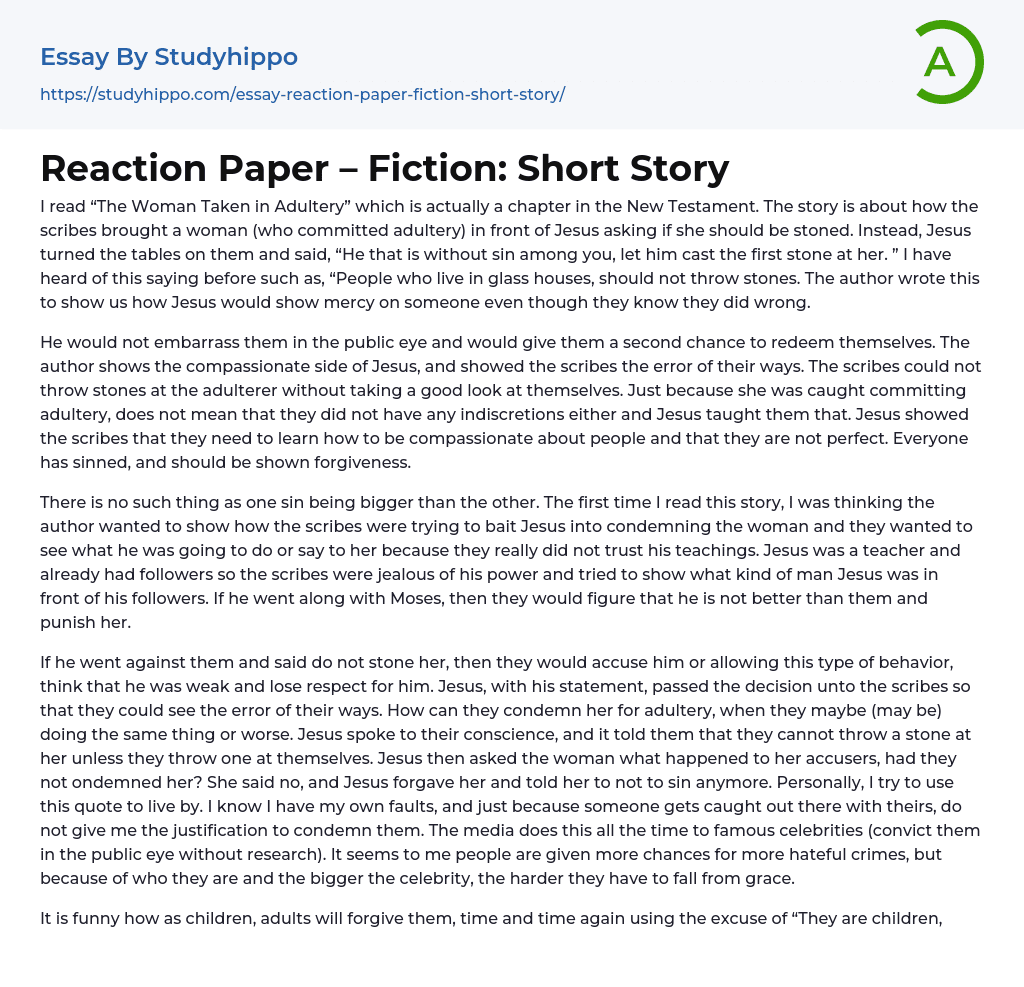I read “The Woman Taken in Adultery” which is actually a chapter in the New Testament. The story is about how the scribes brought a woman (who committed adultery) in front of Jesus asking if she should be stoned. Instead, Jesus turned the tables on them and said, “He that is without sin among you, let him cast the first stone at her. ” I have heard of this saying before such as, “People who live in glass houses, should not throw stones. The author wrote this to show us how Jesus would show mercy on someone even though they know they did wrong.
He would not embarrass them in the public eye and would give them a second chance to redeem themselves. The author shows the compassionate side of Jesus, and showed the scribes the error of their
...ways. The scribes could not throw stones at the adulterer without taking a good look at themselves. Just because she was caught committing adultery, does not mean that they did not have any indiscretions either and Jesus taught them that. Jesus showed the scribes that they need to learn how to be compassionate about people and that they are not perfect. Everyone has sinned, and should be shown forgiveness.
There is no such thing as one sin being bigger than the other. The first time I read this story, I was thinking the author wanted to show how the scribes were trying to bait Jesus into condemning the woman and they wanted to see what he was going to do or say to her because they really did not trust his teachings. Jesus was a teacher and alread
had followers so the scribes were jealous of his power and tried to show what kind of man Jesus was in front of his followers. If he went along with Moses, then they would figure that he is not better than them and punish her.
If he went against them and said do not stone her, then they would accuse him or allowing this type of behavior, think that he was weak and lose respect for him. Jesus, with his statement, passed the decision unto the scribes so that they could see the error of their ways. How can they condemn her for adultery, when they maybe (may be) doing the same thing or worse. Jesus spoke to their conscience, and it told them that they cannot throw a stone at her unless they throw one at themselves. Jesus then asked the woman what happened to her accusers, had they not ondemned her? She said no, and Jesus forgave her and told her to not to sin anymore. Personally, I try to use this quote to live by. I know I have my own faults, and just because someone gets caught out there with theirs, do not give me the justification to condemn them. The media does this all the time to famous celebrities (convict them in the public eye without research). It seems to me people are given more chances for more hateful crimes, but because of who they are and the bigger the celebrity, the harder they have to fall from grace.
It is funny how as children, adults will forgive them, time and time again using the excuse of “They are children, they are
learning right from wrong. ” But, adults have a hard time forgiving other adults. Are we not still learning as we go along? Do we not make mistakes or bad choices as we get older? We should be more forgiving than we are and stop holding people to such high standards, so when they do not meet those standards, they do not have but so far to fall.
The moral of this story is, before you criticize someone else and the choices they make, ensure that you have everything in order as well, and instead help them understand the error of their ways, teach them and lead them to the right path. You just might gain a friend, husband or wife and a lot of respect from your peers for doing the right thing. References: Barnet, S. , Burto, W. , & Cain, W. E. (2007). The Woman Takin in Adultery. In Literature for Composition: Reading and Writing Arguments about Essays, Stories, Poems, and Plays (8th ed. , ). Pearson Longman.
- Where Are You Going Where Have You Been essays
- Ambition essays
- Anger essays
- Betrayal essays
- Boredom essays
- Confidence essays
- Courage essays
- Desire essays
- Disgrace essays
- Doubt essays
- Empathy essays
- Fairness essays
- Fear essays
- Feeling essays
- Forgiveness essays
- Grief essays
- Guilt essays
- Happiness essays
- Harmony essays
- Hate essays
- Honesty essays
- Honor essays
- Hope essays
- Humanity essays
- Inspiration essays
- Kindness essays
- Laughter essays
- Loneliness essays
- Lost essays
- Loyalty essays
- Need essays
- Passion essays
- Pressure essays
- Pride essays
- Regret essays
- Respect essays
- Responsibility essays
- Sarcasm essays
- Shame essays
- Suffering essays
- Suspense essays
- Tolerance essays
- Adam And Eve essays
- Baptism essays
- Catholic Church essays
- Christian essays
- Church essays
- Crucifixion Of Jesus essays
- Crusades essays
- Elizabeth essays




